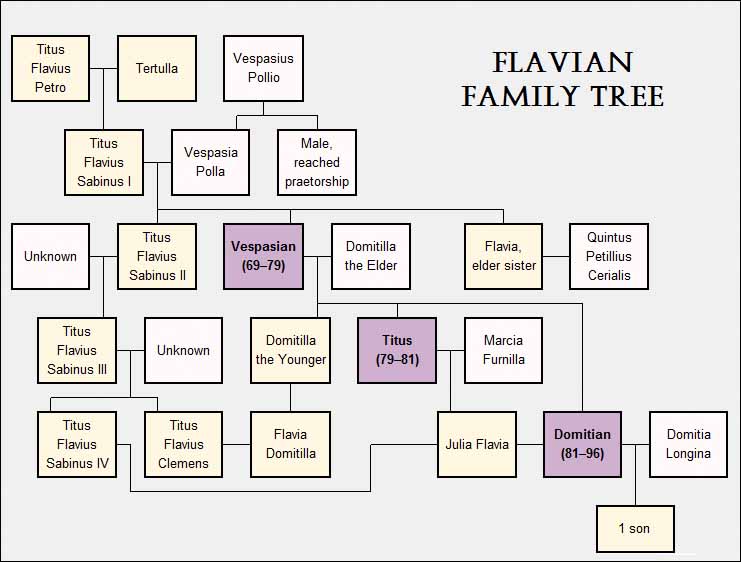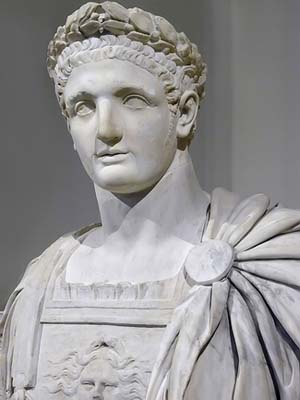
11th Emperor of the Roman Empire
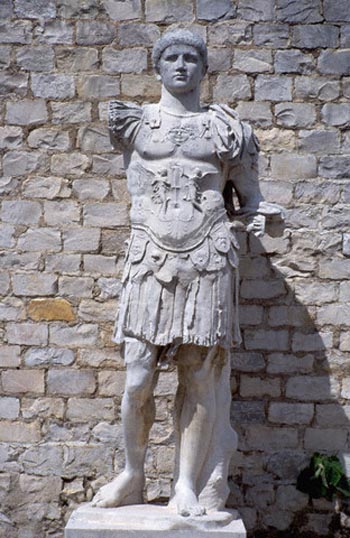

11th Emperor of the Roman Empire

Domitian was declared emperor by the Praetorian Guard the day after Titus' death, commencing a reign which lasted more than fifteen years - longer than any man who had governed Rome since Tiberius. Domitian strengthened the economy by revaluing the Roman coinage, expanded the border defenses of the Empire, and initiated a massive building program to restore the damaged city of Rome.
In Britain, Gnaeus Julius Agricola expanded the Roman Empire as far as modern day Scotland, but in Dacia, Domitian was unable to procure a decisive victory in the war against the Dacians. On September 18, 96, Domitian was assassinated by court officials, and with him the Flavian dynasty came to an end. The same day, he was succeeded by his friend and advisor Nerva, who founded the long-lasting Nervan-Antonian Dynasty.
Domitian's memory was condemned to oblivion by the Roman Senate, with which he had a notoriously difficult relationship throughout his reign. Senatorial authors such as Tacitus, Pliny the Younger and Suetonius published histories after his death, propagating the view of Domitian as a cruel and paranoid tyrant. Modern history has rejected these views, instead characterizing Domitian as a ruthless but efficient autocrat, whose cultural, economic and political program provided the foundation for the Principate of the peaceful 2nd century. His successors Nerva and Trajan were less restrictive, but in reality their policies differed little from Domitian's.
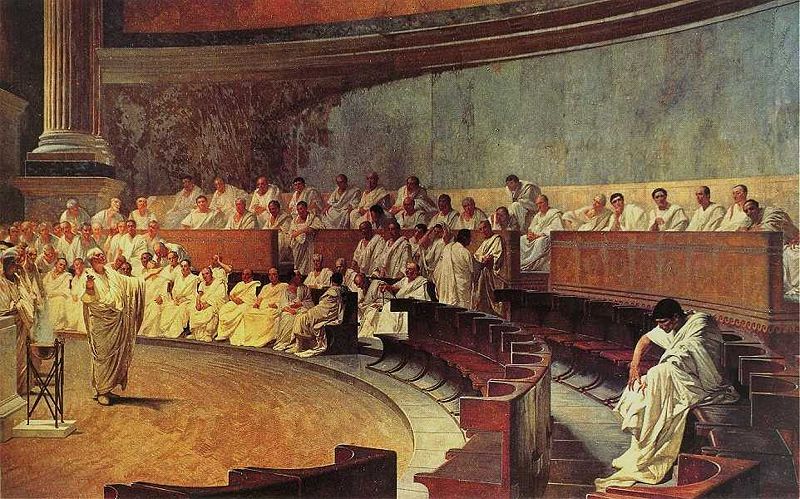
Since the fall of the Republic, the authority of the Roman Senate had largely eroded under the quasi-monarchical system of government established by Augustus, known as the Principate. The Principate allowed the existence of a de facto dictatorial regime, while maintaining the formal framework of the Roman Republic. Most Emperors upheld the public facade of democracy, and in return the Senate implicitly acknowledged the Emperor's status as a de-facto monarch.The civil war of 69 had made it abundantly clear that real power in the Empire lay with control over the army. By the time Vespasian was proclaimed emperor in Rome, any hope of restoring the Republic had long dissipated.
The Flavian approach to government was one of both implicit and explicit exclusion. When Vespasian returned to Rome in mid-70, he immediately embarked on a series of efforts to consolidate his power and prevent future revolts. He offered gifts to the military and dismissed or punished those soldiers loyal to Vitellius. He also restructured the Senatorial and Equestrian orders, removing his enemies and adding his allies. Executive control was largely distributed among members of his family. Non-Flavians were virtually excluded from important public offices, even those who had been among Vespasian's earliest supporters during the civil war.
Mucianus slowly disappears from the historical records during this time, and it is believed he died sometime between 75 and 77.That it was Vespasian's intention to found a long-lasting dynasty to govern the Roman Empire was most evident in the powers he conferred upon his eldest son Titus. Titus shared tribunician power with his father, received seven consulships, the censorship, and perhaps most remarkably, was given command of the Praetorian Guard. Because Titus effectively acted as co-emperor with his father, no abrupt change in Flavian policy occurred during his brief reign from 79 until 81.
Domitian's approach to government was less subtle than his father and brother. Once Emperor, he quickly dispensed with the Republican facade and transformed his government more or less formally into the divine monarchy he believed it to be. By moving the centre of power to the imperial court, Domitian openly rendered the Senate's powers obsolete. He became personally involved in all branches of the administration: edicts were issued governing the smallest details of everyday life and law, while taxation and public morals were rigidly enforced.
Nevertheless, Domitian did make concessions toward senatorial opinion. Whereas his father and brother had virtually excluded non-Flavians from public office, Domitian rarely favored his own family members in the distribution of strategic posts, admitting a surprisingly large number of provincials and potential opponents to the consulship, and assigning men of the equestrian order to run the imperial bureaucracy.
One of Vespasian's first acts as Emperor was to enforce a tax reform to restore the Empire's depleted treasury. After Vespasian arrived in Rome in mid-70, Mucianus continued to press Vespasian to collect as many taxes as possible, renewing old ones and instituted new ones. Mucianus and Vespasian increased the tribute of the provinces, and kept a watchful eye upon the treasury officials. The Latin proverb "Pecunia non olet" ("Money does not smell") may have been created when he had introduced a urine tax on public toilets.
Upon his accession, Domitian revalued the Roman coinage to the standard of Augustus, increasing the silver content of the denarius by 12%. An imminent crisis in 85 however forced a devaluation to the Neronian standard of 65, but this was still higher than the level which Vespasian and Titus had maintained during their reign, and Domitian's rigorous taxation policy ensured that this standard was sustained for the following eleven years.Coin types from this era display a highly consistent degree of quality, including meticulous attention to Domitian's titulature, and exceptionally refined artwork on the reverse portraits.
Jones estimates Domitian's annual income at more than 1,200 million sestertii, of which over one third would presumably have been spent at maintaining the Roman army. The other major area of expenditure encompassed the vast reconstruction programme carried out on the city of Rome itself.
The most significant military campaign undertaken during the Flavian period, was the siege and destruction of Jerusalem in 70 by Titus. The destruction of the city was the culmination of the Roman campaign in Judeae following the Jewish uprising of 66.
The Second Temple was completely demolished, after which Titus's soldiers proclaimed him imperator in honor of the victory. Jerusalem was sacked and much of the population killed or dispersed. Josephus claims that 1,100,000 people were killed during the siege, of which a majority were Jewish. 97,000 were captured and enslaved, including Simon Bar Giora and John of Gischala.
Many fled to areas around the Mediterranean. Titus reportedly refused to accept a wreath of victory, as there is "no merit in vanquishing people forsaken by their own God". Upon his return to Rome in 71, Titus was awarded a triumph. Accompanied by Vespasian and Domitian, he rode into the city, enthusiastically saluted by the Roman populace and preceded by a lavish parade containing treasures and captives from the war.
Josephus describes a procession with large amounts of gold and silver carried along the route, followed by elaborate re-enactments of the war, Jewish prisoners, and finally the treasures taken from the Temple of Jerusalem, including the Menorah and the Pentateuch. Leaders of the resistance were executed in the Forum, after which the procession closed with religious sacrifices at the Temple of Jupiter.The triumphal Arch of Titus, which stands at one entrance to the Forum, memorializes the victory of Titus.
The conquest of Britain continued under command of Gnaeus Julius Agricola, who expanded the Roman Empire as far as Caledonia, or modern day Scotland, between 77 and 84.
In 82 Agricola crossed an unidentified body of water and defeated peoples unknown to the Romans until then. He fortified the coast facing Ireland, and Tacitus recalls that his father-in-law often claimed the island could be conquered with a single legion and a few auxiliaries. He had given refuge to an exiled Irish king whom he hoped he might use as the excuse for conquest.
This conquest never happened, but some historians believe that the crossing referred to was in fact a small-scale exploratory or punitive expedition to Ireland. The following year Agricola raised a fleet and pushed beyond the Forth into Caledonia. To aid the advance, an expansive legionary fortress was constructed at Inchtuthil.
In the summer of 84, Agricola faced the armies of the Caledonians, led by Calgacus, at the Battle of Mons Graupius. Although the Romans inflicted heavy losses on the Calidonians, two thirds of their army managed to escape and hide in the Scottish marshes and Highlands, ultimately preventing Agricola from bringing the entire British island under his control.
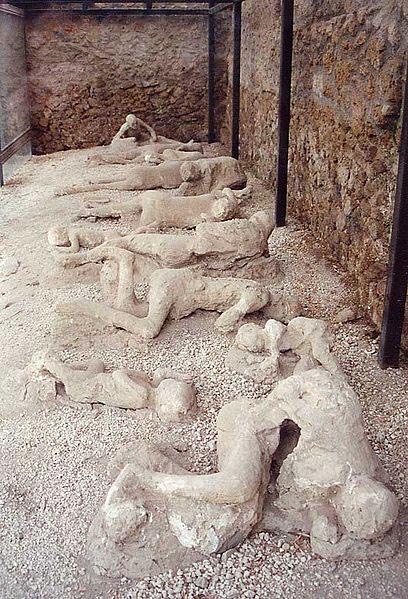
Although his administration was marked by a relative absence of major military or political conflicts, Titus faced a number of major disasters during his brief reign. On August 24, 79, barely two months after his accession, Mount Vesuvius erupted, resulting in the almost complete destruction of life and property in the cities and resort communities around the Bay of Naples. The cities of Pompeii and Herculaneum were buried under metres of stone and lava, killing thousands of citizens. Titus appointed two ex-consuls to organize and coordinate the relief effort, while personally donating large amounts of money from the imperial treasury to aid the victims of the volcano.
Additionally, he visited Pompeii once after the eruption and again the following year. The city was lost for nearly 1700 years before its accidental rediscovery in 1748. Since then, its excavation has provided an extraordinarily detailed insight into the life of a city at the height of the Roman Empire, frozen at the moment it was buried on August 24, 79.
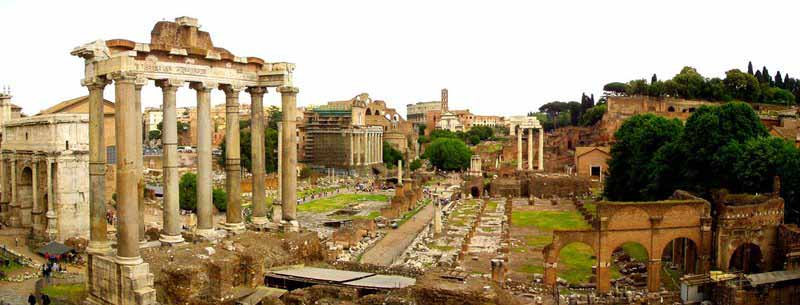
The Forum, the baths, many houses, and some out-of-town villas like the Villa of the Mysteries remain surprisingly well preserved. Today, it is one of the most popular tourist attractions of Italy and a UNESCO World Heritage Site. On-going excavations reveal new insights into the Roman history and culture.
During Titus' second visit to the disaster area, a fire struck Rome which lasted for three days. Although the extent of the damage was not as disastrous as during the Great Fire of 64, crucially sparing the many districts of insulae, Cassius Dio records a long list of important public buildings that were destroyed, including Agrippa's Pantheon, the Temple of Jupiter, the Diribitorium, parts of Pompey's Theatre and the Saepta Julia among others. Once again, Titus personally compensated for the damaged regions. According to Suetonius, a plague similarly struck during the fire. The nature of the disease, however, or the death toll are unknown.
Suetonius claims that Vespasian was continuously met with conspiracies against him. Only one conspiracy is known specifically. In 78 or 79, Eprius Marcellus and Aulus Caecina Alienus attempted to incite the Praetorian Guard to mutiny against Vespasian, but the conspiracy was thwarted by Titus.
According to the historian John Crook however, the alleged conspiracy was in fact a calculated plot by the Flavian faction to remove members of the opposition tied to Mucianus, with the mutinous address found on Caecina's body a forgery by Titus. When faced with real conspiracies however, Vespasian and Titus treated their enemies with lenience. "I will not kill a dog that barks at me," were words expressing the temper of Vespasian, while Titus once demonstrated his generosity as Emperor by inviting men who were suspected of aspiring to the throne to dinner, rewarding them with gifts and allowing them to be seated next to him at the games.
Domitian appears to have met with several conspiracies during his reign, one of which led to his eventual assassination in 96. The first significant revolt arose on 1 January 89, when the governor of Germania Superior, Lucius Antonius Saturninus, and his two legions at Mainz, Legio XIV Gemina and Legio XXI Rapax, rebelled against the Roman Empire with the aid of the Chatti. The precise cause for the rebellion is uncertain, although it appears to have been planned well in advance.
The Senatorial officers may have disapproved of Domitian's military strategies, such as his decision to fortify the German frontier rather than attack, his recent retreat from Britain, and finally the disgraceful policy of appeasement towards Decebalus. At any rate, the uprising was strictly confined to Saturninus' province, and quickly detected once the rumor spread across the neighboring provinces.
The governor of Germania Inferior, Lappius Maximus, moved to the region at once, assisted by the procurator of Rhaetia, Titus Flavius Norbanus. From Spain, Trajan was summoned, whilst Domitian himself came from Rome with the Praetorian Guard. By a stroke of luck, a thaw prevented the Chatti from crossing the Rhine and coming to Saturninus' aid. Within twenty-four days the rebellion was crushed, and its leaders at Mainz savagely punished. The mutinous legions were sent to the front in Illyricum, while those who had assisted in their defeat were duly rewarded.
Both Tacitus and Suetonius speak of escalating persecutions toward the end of Domitian's reign, identifying a point of sharp increase around 93, or sometime after the failed revolt of Saturninus in 89. At least twenty senatorial opponents were executed, including Domitia Longina's former husband Lucius Aelius Lamia and three of Domitian's own family members, Titus Flavius Sabinus IV, Titus Flavius Clemens and Marcus Arrecinus Clemens. Some of these men were executed as early as 83 or 85 however, lending little credit to Tacitus' notion of a "reign of terror" late in Domitian's reign. According to Suetonius, some were convicted for corruption or treason, others on trivial charges, which Domitian justified through his suspicion.
Since the reign of Tiberius, the rulers of the Julio-Claudian dynasty had legitimized their power largely through direct descendance from Augustus and Julius Caesar. Vespasian could no longer claim such a relation however. Therefore, a massive propaganda campaign was initiated to justify Flavian rule as having been predetermined through divine providence. As early as 70, rumors circulated of Vespasian healing the sick and raising the dead in Egypt.
At the same time, Flavian propaganda emphasised Vespasian's role as a bringer of peace following the crisis of 69. Nearly one-third of all coins minted in Rome under Vespasian celebrated military victory or peace, while the word vindex was removed from coins as to not remind the public of rebellious Vindex. Construction projects bore inscriptions praising Vespasian and condemning previous emperors, and a Temple of Peace was constructed in the forum.
The Flavians also controlled public opinion through literature. Vespasian approved histories written under his reign, assuring biases against him were removed, while also giving financial rewards to contemporary writers. The ancient historians that lived through the period such as Tacitus, Suetonius, Josephus and Pliny the Elder speak suspiciously well of Vespasian while condemning the emperors that came before him. Tacitus admits that his status was elevated by Vespasian, Josephus identifies Vespasian as a patron and savior, and Pliny dedicated his Natural Histories to Vespasian, Titus. Those that spoke against Vespasian were punished. A number of stoic philosophers were accused of corrupting students with inappropriate teachings and were expelled from Rome. Helvidius Priscus, a pro-republic philosopher, was executed for his teachings.
Titus and Domitian also revived the practice of the imperial cult, which had fallen somewhat out of use under Vespasian. Significantly, Domitian's first act as an Emperor was the deification of his brother Titus. Upon their deaths, his infant son, and niece Julia Flavia, were likewise enrolled among the Gods. To foster the worship of the imperial family, Domitian erected a dynastic mausoleum on the site of Vespasian's former house on the Quirinal, and completed the Temple of Vespasian and Titus, a shrine dedicated to the worship of his deified father and brother.
To memorialize the military triumphs of the Flavian family, he ordered the construction of the Templum Divorum and the Templum Fortuna Redux, and completed the Arch of Titus. In order to further justify the divine nature of the Flavian rule, Domitian also emphasized connections with the chief deity Jupiter, most significantly through the impressive restoration of the Temple of Jupiter on the Capitoline Hill.
The Flavian dynasty is perhaps best known for its vast construction programme on the city of Rome, intended to restore the capital from the damage it had suffered during the Great Fire of 64, and the civil war of 69. Vespasian added the temple of Peace and the temple to the Deified Claudius.
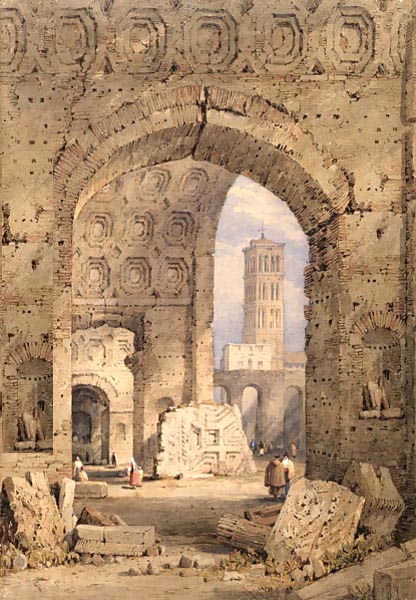
In 75 a colossal statue of Apollo, begun under Nero as a statue of himself, was finished on Vespasian's orders, and he also dedicated a stage of the theater of Marcellus. Construction of the Flavian Amphitheatre, presently better known as the Colosseum (probably after the nearby statue), was begun in 70 under Vespasian and finally completed in 80 under Titus. In addition to providing spectacular entertainments to the Roman populace, the building was also conceived as a gigantic triumphal monument to commemorate the military achievements of the Flavians during the Jewish wars.
Adjacent to the amphitheatre, within the precinct of Nero's Golden House, Titus also ordered the construction of a new public bath-house, which was to bear his name. Construction of this building was hastily finished to coincide with the completion of the Flavian Amphitheatre.
The bulk of the Flavian construction projects was carried out during the reign of Domitian, who spent lavishly to restore and embellish the city of Rome. Much more than a renovation project however, Domitian's building program was intended to be the crowning achievement of an Empire wide cultural renaissance. Around fifty structures were erected, restored or completed, a number second only to the amount erected under Augustus.
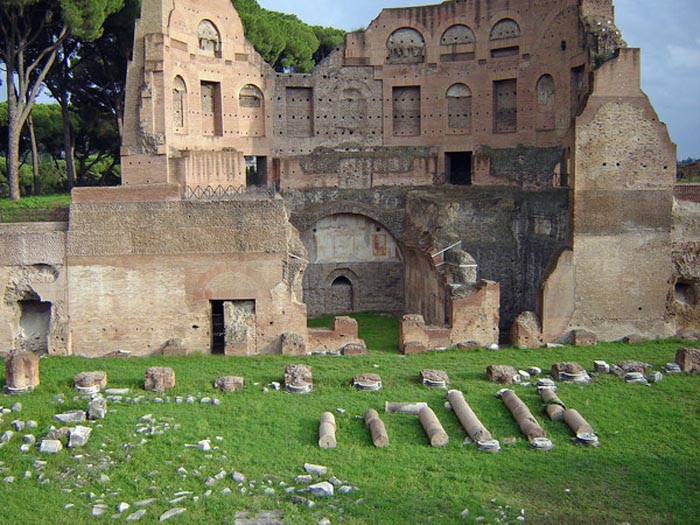
Among the most important new structures were an Odeum, a Stadium, and an expansive palace on the Palatine Hill, known as the Flavian Palace, which was designed by Domitian's master architect Rabirius. The most important building Domitian restored was the Temple of Jupiter on the Capitoline Hill, which was said to have been covered with a gilded roof. Among those he completed were the Temple of Vespasian and Titus, the Arch of Titus, and the Colosseum, to which he added a fourth level and finished the interior seating area.
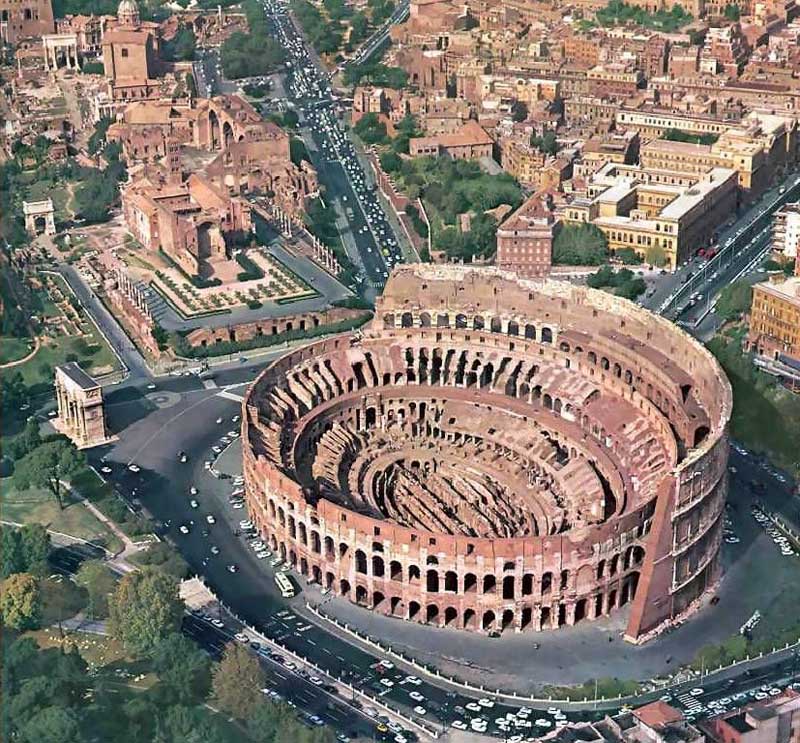
Both Titus and Domitian were fond of gladiatorial games, and realized its importance to appease the citizens of Rome. In the newly constructed Colosseum, the Flavians provided for spectacular entertainments. The Inaugural games of the Flavian Amphitheatre lasted for a hundred days and were said to be extremely elaborate, including gladiatorial combat, fights between wild animals (elephants and cranes), mock naval battles for which the theatre was flooded, horse races and chariot races. During the games, wooden balls were dropped into the audience, inscribed with various prizes (clothing, gold, or even slaves), which could then be traded for the designated item.
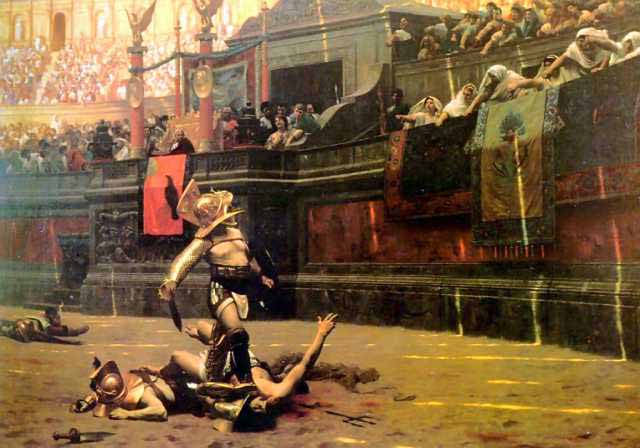
An estimated 135 million sestertii was spent on donatives, or congiaria, throughout Domitian's reign. In addition, he also revived the practice of public banquets, which had been reduced to a simple distribution of food under Nero, while he invested large sums on entertainment and games.
In 86, he founded the Capitoline Games, a quadrennial contest comprising athletic displays, chariot races, and competitions for oratory, music and acting. Domitian himself supported the travels of competitors from the whole Empire and attributed the prizes. Innovations were also introduced into the regular gladiatorial games, such as naval contests, night-time battles, and female and dwarf gladiator fights. Finally, he added two new factions, Gold and Purple, to chariot races, besides the regular White, Red, Green and Blue teams.
The Flavians, although a relatively short-lived dynasty, helped restore stability to an empire on its knees. Although all three have been criticized, especially based on their more centralized style of rule, they issued reforms that created a stable enough empire to last well into the 3rd century. However, their background as a military dynasty led to further marginalization of the senate, and a conclusive move away from princeps, or first citizen, and toward imperator, or emperor.
Little factual information survives about Vespasian's government during the ten years he was emperor, his reign is best known for financial reforms following the demise of the Julio-Claudian dynasty. Vespasian was noted for his mildness and for loyalty to the people. For example, much money was spent on public works and the restoration and beautification of Rome: a new forum, the Temple of Peace, the public baths and the Colosseum.
Titus's record among ancient historians stands as one of the most exemplary of any emperor. All the surviving accounts from this period, many of them written by his own contemporaries such as Suetonius Tranquilius, Cassius Dio, Pliny the Elder, present a highly favorable view towards Titus. His character has especially prospered in comparison with that of his brother Domitian. In contrast to the ideal portrayal of Titus in Roman histories, in Jewish memory "Titus the Wicked" is remembered as an evil oppressor and destroyer of the Temple. For example, one legend in the Babylonian Talmud describes Titus as having had sex with a whore on a Torah scroll inside the Temple during its destruction.
Although contemporary historians vilified Domitian after his death, his administration provided the foundation for the peaceful empire of the 2nd century AD, and the culmination of the 'Pax Romana'. His successors Nerva and Trajan were less restrictive, but in reality their policies differed little from Domitian's. Much more than a gloomy coda to the 1st century, the Roman Empire prospered between 81 and 96, in a reign which Theodor Mommsen described as the sombre but intelligent despotism of Domitian.
